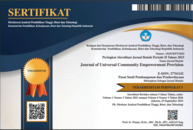Empowering Youth who Care About Democracy: Introducing General Elections to First-Time Voters
DOI:
https://doi.org/10.55885/jucep.v2i3.255Keywords:
Empowerment, Youth, Democracy, General Elections, First-Time VotersAbstract
The goal of this initiative was to educate first-time voters about the democratic process and give young people a voice in civic life. Workshops were held to teach people how to vote, drives were organized to get people registered to vote, there was a social media campaign, and there was even an attempt to get people out to the polls on election day. The initiative's stated purpose was to help first-time voters become actively engaged in the political process by increasing their turnout at the polls. Participants' increased knowledge and confidence in their abilities to vote in the main election indicates that the program achieved its purpose. Participants gained a grasp of the democratic process, candidates, and problems through the seminars, and all eligible citizens were registered to vote through the voter registration efforts. Election day mobilization provided participants with resources and support to ensure they were able to cast ballots, while the social media campaign helped to engage people and establish a feeling of community. In general, the program achieved its goal of encouraging first-time voters to cast ballots. This program's success exemplifies the power of young people to determine the future of their communities and countries via education and engagement, and it demonstrates the relevance of these factors in building a healthy and vibrant democracy.References
Alhammadi, S. (2021). The effect of the COVID-19 pandemic on learning quality and practices in higher education—using deep and surface approaches. Education Sciences, 11(9). https://doi.org/10.3390/educsci11090462.
Alqahtani, E., Janbi, N., Sharaf, S., & Mehmood, R. (2022a). Smart Homes and Families to Enable Sustainable Societies: A Data-Driven Approach for Multi-Perspective Parameter Discovery Using BERT Modelling. Sustainability (Switzerland), 14(20). https://doi.org/10.3390/su142013534.
Alqahtani, E., Janbi, N., Sharaf, S., & Mehmood, R. (2022b). Smart Homes and Families to Enable Sustainable Societies: A Data-Driven Approach for Multi-Perspective Parameter Discovery Using BERT Modelling. Sustainability (Switzerland), 14(20). https://doi.org/10.3390/su142013534.
Bärnthaler, R., Novy, A., & Plank, L. (2021). The foundational economy as a cornerstone for a social–ecological transformation. Sustainability (Switzerland), 13(18). https://doi.org/10.3390/su131810460.
de Andrade, B., Poplin, A., & de Sena, Í. S. (2020). Minecraft as a tool for engaging children in urban planning: A Case study in Tirol Town, Brazil. ISPRS International Journal of Geo-Information, 9(3). https://doi.org/10.3390/ijgi9030170.
Gee, G., Sheridan, S., Charles, L., Dayne, L., Joyce, L., Stevens, J., Paradies, Y., Hulbert, C., Haslam, N., Thorpe, R., Thorpe, L., Thorpe, A., Stewart, P., Austin, L., Lyons, L., Belfrage, M., Warber, R., Paxton, A., & Thompson, L. (2022). The Her Tribe and His Tribe Aboriginal-Designed Empowerment Programs. International Journal of Environmental Research and Public Health, 19(4). https://doi.org/10.3390/ijerph19042381.
Han, H., & Ahn, S. W. (2020). Youth mobilization to stop global climate change: Narratives and impact. Sustainability (Switzerland), 12(10). https://doi.org/10.3390/su12104127.
Kuba, O., & Stejskal, J. (2021). Economic and political consequences of the compulsory voting in public parliamentary elections: Czech case study. Economies, 9(2). https://doi.org/10.3390/economies9020063.
Moczek, N., Hecker, S., & Voigt-Heucke, S. L. (2021). The known unknowns: What citizen science projects in Germany know about their volunteers—and what they don’t know. Sustainability (Switzerland), 13(20). https://doi.org/10.3390/su132011553.
Ning, B., Zong, X., He, K., & Lian, L. (2023). PREIUD: An Industrial Control Protocols Reverse Engineering Tool Based on Unsupervised Learning and Deep Neural Network Methods. Symmetry, 15(3), 706. https://doi.org/10.3390/sym15030706.
Pino-Ortega, J., Rojas-Valverde, D., Gómez-Carmona, C. D., & Rico-González, M. (2021). Training design, performance analysis and talent identification—a systematic review about the most relevant variables through the principal component analysis in soccer, basketball and rugby. In International Journal of Environmental Research and Public Health (Vol. 18, Issue 5, pp. 1–18). MDPI AG. https://doi.org/10.3390/ijerph18052642.
Roche, C., Fisher, A., Fancourt, D., & Burton, A. (2022). Exploring Barriers and Facilitators to Physical Activity during the COVID-19 Pandemic: A Qualitative Study. International Journal of Environmental Research and Public Health, 19(15). https://doi.org/10.3390/ijerph19159169.
Shai, L., Molefinyana, C., & Quinot, G. (2019). Public Procurement in the Context of Broad-Based Black Economic Empowerment (BBBEE) in South Africa-Lessons Learned for Sustainable Public Procurement. Sustainability (Switzerland), 11(24). https://doi.org/10.3390/su11247164.
Simms, L., Ottman, K. E., Griffith, J. L., Knight, M. G., Norris, L., Karakcheyeva, V., & Kohrt, B. A. (2023). Psychosocial Peer Support to Address Mental Health and Burnout of Health Care Workers Affected by COVID-19: A Qualitative Evaluation. International Journal of Environmental Research and Public Health, 20(5). https://doi.org/10.3390/ijerph20054536 .
Yang, J., & Kinchin, G. (2022). University as a Site to Learn Citizenship from the Perspectives of Students in the UK. Sustainability (Switzerland), 14(3). https://doi.org/10.3390/su14031939.
Yhee, H., Kim, S., & Kang, S. (2021). Gis-based evaluation method for accessibility of social infrastructure facilities. Applied Sciences (Switzerland), 11(12). https://doi.org/10.3390/app11125581.
Downloads
Published
How to Cite
Issue
Section
License
Copyright (c) 2023 Journal of Universal Community Empowerment Provision

This work is licensed under a Creative Commons Attribution-ShareAlike 4.0 International License.
















